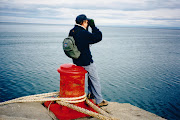Over the weekend I attended a workshop led by Brooke Williams, author of the lovely memoir Halflives and my neighbor here in the beautiful southern Utah wilderness. Brooke is now at work on the story of one of his Mormon ancestors. Or possibly at work on more than one story about more than one ancestor. Brooke isn't sure. Dead people keep talking to him.
"Let's just be still and listen for a while," Brooke said, "and see if anyone comes to us, and just start writing and see what we find."
There were ten of us around the table. None of us regarded Brooke's request as an unreasonable one. Most of us were already in the habit of spending time with invisible people. Most of us knew that the job of the writer is to make the unseen seen.
I closed my eyes and waited. It wasn't long before a dead man came to me, a relation I'd been aware of but never thought--or wanted to think--much about, a violinist and teacher of violin who'd lived a long and (I hoped) productive life before being exterminated at the Sobibor concentration camp. His showing up surprised me; we'd never chatted before. (I really hadn't wanted to think about him.) But there he was. I was able to write a bit about how I knew about him, a few pages of stiff, self-conscious writing of the kind you do when you feel someone's right at your back. Then we took a break and went out for lunch, and then we came in again and sat down to write some more.
The afternoon was better; I wrote about how, when I was young, I didn't want to play the voilin because it would leave black marks on my neck. How I chose the flute instead, which ended up being a disaster because, not only did the instrument not touch me, it didn't suit me at all.
I thought about how, only recently, I'd picked up a friend's violin and how strangely familiar it and the bow had seemed.
You see, the voice said behind me, you need to play what fits naturally to your hand, even if it bruises you.
The work I do often comes painfully to me. I'm often tempted to play something else, something shiny instead of strung with gut. Then when I do . . .
You find you don't have the mouth for it.
Right.
Ah. So then you know.
Yes.
It was time to put our pens down and talk about what we'd written. Brooke had been chatting with a man on a train traveling West from Denver. Monette had a woman lead her down into a well and tell her to sit there. Diana didn't want to think about the dead anymore and wrote about a tree. Riley's grandfather, a World War II pilot, had killed himself and she didn't know why. Nancy had a woman tell her, "You can never speak all the love inside you."
"When you get to the core of things," Brooke said, "you end up writing a story that you think is not your story. But it is your story. Because it's everybody's story. Everybody lives there."
Andante.
--MD













No comments:
Post a Comment